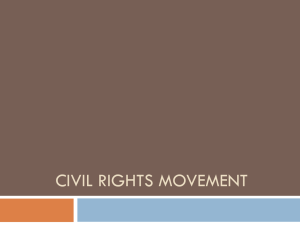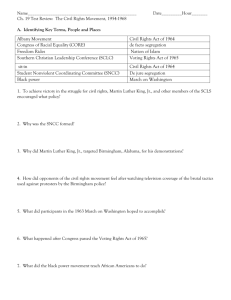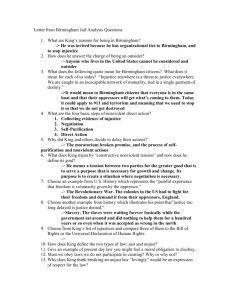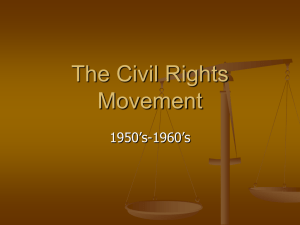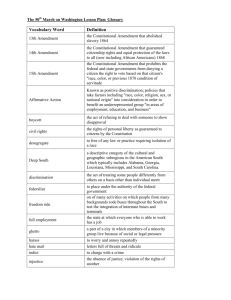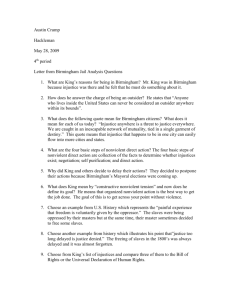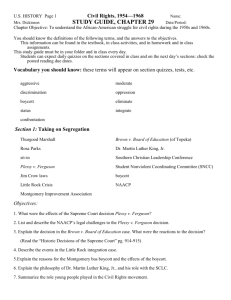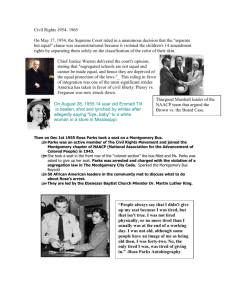Civil Rights Movement Assessment: Post-WWII to Affirmative Action
advertisement
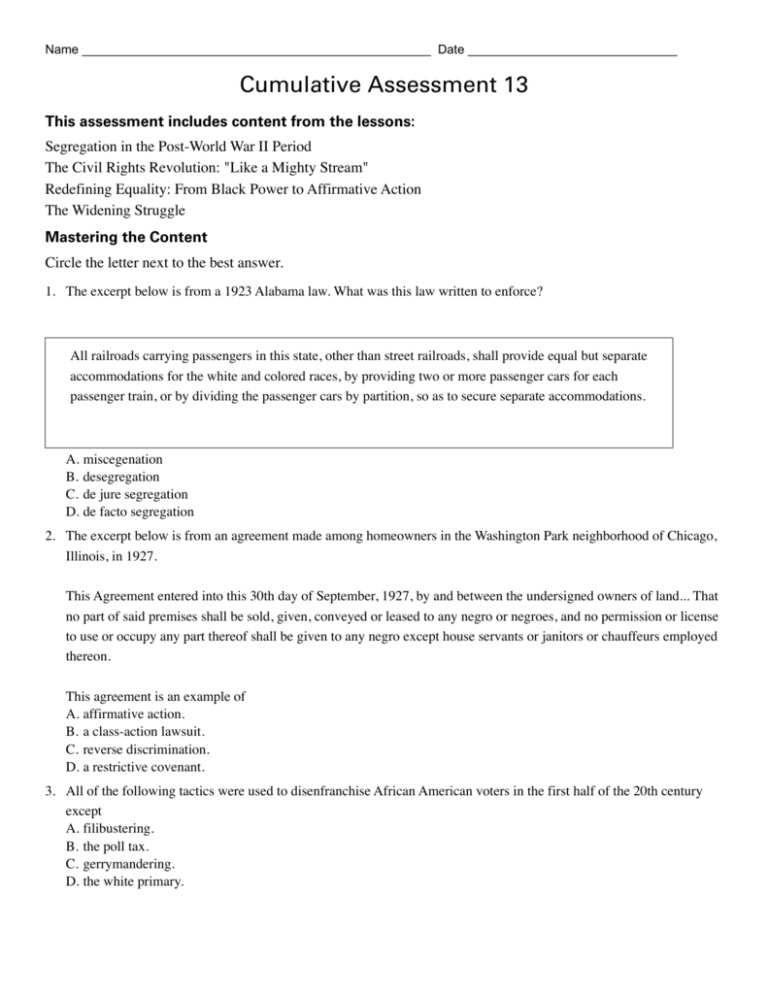
Name __________________________________________________ Date ______________________________ Cumulative Assessment 13 This assessment includes content from the lessons: Segregation in the Post-World War II Period The Civil Rights Revolution: "Like a Mighty Stream" Redefining Equality: From Black Power to Affirmative Action The Widening Struggle Mastering the Content Circle the letter next to the best answer. 1. The excerpt below is from a 1923 Alabama law. What was this law written to enforce? All railroads carrying passengers in this state, other than street railroads, shall provide equal but separate accommodations for the white and colored races, by providing two or more passenger cars for each passenger train, or by dividing the passenger cars by partition, so as to secure separate accommodations. A. miscegenation B. desegregation C. de jure segregation D. de facto segregation 2. The excerpt below is from an agreement made among homeowners in the Washington Park neighborhood of Chicago, Illinois, in 1927. This Agreement entered into this 30th day of September, 1927, by and between the undersigned owners of land... That no part of said premises shall be sold, given, conveyed or leased to any negro or negroes, and no permission or license to use or occupy any part thereof shall be given to any negro except house servants or janitors or chauffeurs employed thereon. This agreement is an example of A. affirmative action. B. a class-action lawsuit. C. reverse discrimination. D. a restrictive covenant. 3. All of the following tactics were used to disenfranchise African American voters in the first half of the 20th century except A. filibustering. B. the poll tax. C. gerrymandering. D. the white primary. 4. In 1948, President Harry Truman issued Executive Order 9981. What did this order call for? A. desegregation of the armed forces B. the end of the white primary C. preferential treatment in hiring D. the outlawing of racial zoning 5. What lawsuit was brought before the Supreme Court to challenge the constitutionality of school segregation laws? A. Alexander v. Holmes County Board of Education B. Brown v. Board of Education C. Regents of the University of California v. Bakke D. Swann v. Charlotte-Mecklenburg Board of Education 6. Which of these tactics did Martin Luther King Jr. and the Southern Christian Leadership Conference use most effectively in their struggle to win equal rights for African Americans? A. armed rebellion B. affirmative action C. nonviolent resistance D. reverse discrimination 7. The photograph below was taken during a civil rights protest in Birmingham, Alabama, in 1963. What resulted from the events shown in the photograph and the publicity they generated? A. Civil rights activists in Birmingham began to carry weapons. B. Martin Luther King Jr. organized a bus boycott in Birmingham. C. City leaders agreed to desegregate public facilities in Birmingham. D. The Supreme Court ordered Birmingham schools to be desegregated. 8. The landmark Civil Rights Act of 1964 outlawed racial discrimination in all of the following areas except A. employment. B. housing. C. public accommodations. D. public schools. 9. Examine the table below. Which of these campaigns was aimed at registering African Americans in the state with the lowest percentage of black voters? A. Freedom Rides B. Freedom Summer C. March on Washington D. Montgomery Bus Boycott 10. The statement below is from the Kerner Commission Report, issued in 1968. What led to the formation of the Kerner Commission? Social and economic conditions... constituted a clear pattern of severe disadvantages for Negroes compared with whites. A. the assassination of Martin Luther King Jr. B. the call for black nationalism by the Nation of Islam C. the murder of three civil rights workers in Mississippi D. the spread of race riots from Watts to other urban ghettos 11. Examine the circle graphs below. How did the Voting Rights Act of 1965 help to bring about the change shown in these graphs? A. It declared African Americans to be citizens with the right to vote. B. It ordered National Guard troops to protect black voters in the South. C. It required federal supervision of voter registration in parts of the South. D. It made the denial of the right to vote for failing to pay poll taxes unconstitutional. 12. Read the descriptions below. Which person do these descriptions best fit? Joined the Nation of Islam in 1952 to promote black nationalism Rejected nonviolence as a strategy to bring about change Converted to orthodox Islam in 1964 and reached out to people of all races A. Stokely Carmichael B. James Meredith C. Elijah Muhammad D. Malcolm X 13. Which of these groups sent observers into the streets armed with law books and shotguns to protect blacks from police mistreatment in the 1960s? A. Black Panthers B. Nation of Islam C. Congressional Black Caucus D. Student Nonviolent Coordinating Committee (SNCC) 14. In which of these areas did the Civil Rights Act of 1968 ban discrimination? A. employment B. housing C. public facilities D. university admissions 15. Examine the circle graphs below. Which of the following was most responsible for the trend shown in these graphs? A. affirmative action B. black nationalism C. civil disobedience D. nonviolent resistance 16. Examine the diagram below. To which of these proposed constitutional amendments does the diagram apply? A. school prayer amendment B. poll tax amendment C. flag burning amendment D. equal rights amendment 17. Which of these organizations was founded in the 1960s "to bring women into full participation in the mainstream of American society"? A. Women's Army Corp B. League of Women Voters C. National Organization for Women D. National American Woman Suffrage Association 18. Read the descriptions below. Which person do these descriptions best fit? Helped found the United Farm Workers Organized a national boycott of grapes Used hunger strikes to draw attention to the plight of migrant workers A. Cesar Chavez B. Betty Friedan C. Rodolfo Gonzales D. Maggie Kuhn 19. Which of the following was responsible for the occupation of Alcatraz Island, the Trail of Broken Treaties, and the Longest Walk? A. Gray Panthers B. La Raza Unida C. Red Power movement D. Yellow Power movement 20. What was the main goal of the Japanese American Citizens League in the late 1970s and 1980s? A. to develop Japanese American ethnic studies programs B. to encourage voter registration among Japanese Americans C. to combat the myth of Japanese Americans as the model minority D. to obtain reparations for Japanese Americans interned during World War II Exploring American Ideals: Essay Question In this unit, you explored a number of events in the civil rights movement from the 1940s through the 1970s. Now you will use what you learned to write a short essay about one of those events. A Key Event in the Civil Rights Movement Examine the list below of significant events in the civil rights movement. 1948 1954 1955 1963 1963 1964 1965 1965 1966 1969 1969 1973 1988 President Truman issues Executive Order 9981 Supreme Court decides Brown v. Board of Education Montgomery Bus Boycott begins March on Washington Publication of The Feminine Mystique Civil Rights Act of 1964 enacted Watts riot United Farm Workers begin grape boycott Black Panther Party issues 10-point platform Indians of All Tribes occupies Alcatraz Island Stonewall riots Supreme Court decides Roe v. Wade Reparations awarded to Japanese American internees 21. Choose one event from the list that you feel was particularly significant, and discuss it in a short essay. Your essay should contain these elements: • a thesis statement in which you identify the event you have chosen and take a position on its significance • a description of the event that includes details about what happened, who was involved, where and when the event took place, and why it occurred • support for your thesis in which you discuss why the event was significant, both for the people immediately involved and for the nation as a whole • a conclusion in which you restate your thesis and leave the reader with something to think about
